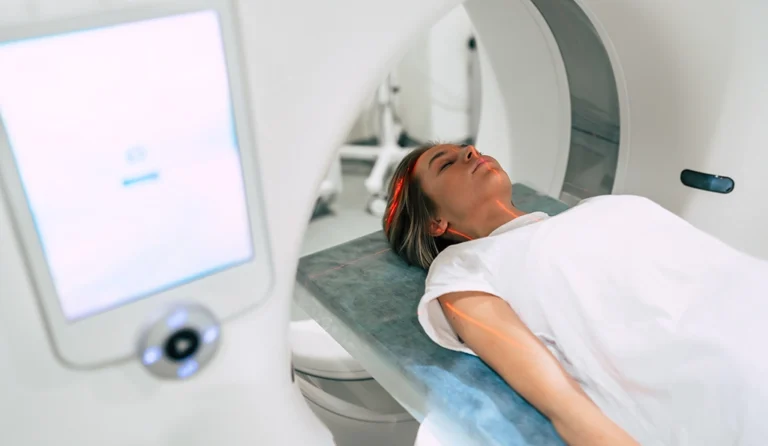An abdominal CT scan uses X-ray technology and specialized computers to create images of your abdomen. For this type of CT scan, preparation is extremely important to ensure accurate images are portrayed. Low-quality images can result in a poor diagnosis, which could lead to ineffective treatment plans. Before your appointment, learn about what proper preparation looks like and how an abdominal CT scan can help you.
What Can An Abdominal CT Scan Detect?
An abdominal CT scan can detect a wide range of gastrointestinal medical conditions. Generally, a gastroenterologist will order an abdominal CT scan when a patient experiences unexplained pain in the abdominal or pelvic region. An abdominal CT scan can detect a variety of medical conditions including:
- Abscesses
- Appendicitis
- Cancer of various abdominal organs
- Inflammatory bowel disease (IBS)
- Pancreatitis
How Do I Prepare?
Your physician will provide special instructions on how to prepare for an abdominal CT scan prior to your appointment. Your physician will instruct you to fast for a certain timeframe prior to your appointment. Certain medications may need to be halted before the day of your appointment. Avoid wearing uncomfortable clothing or any accessories including jewelry, glasses, pins, and hearing aids to your appointment. When you arrive, you may be asked to drink a contrast material that helps the scan produce higher-quality images throughout your gastrointestinal system.
Are Abdominal CT Scans Safe?
A lot of patients may express concern regarding the safety of diagnostic imaging studies, including MRI and CT scans. All types of CT scans, including abdominal types, expose the patient to a very small amount of radiation. In most cases, CT scans provide way more positives than negatives. Your physician and our team at SJRA will always have your best interest at heart. A physician will only ever request a CT scan if it helps reach an accurate diagnosis.
South Jersey Radiology Associates (SJRA) has eleven convenient locations across South Jersey. SJRA houses state-of-the-art technology and offers diagnostic imaging scans that may save you up to 60% more than other hospital-based imaging facilities. You can schedule your CT scan appointment with SJRA at any one of the following offices:
- Haddonfield Office – Haddonfield, NJ
- Marlton (Greentree) Office – Marlton, NJ
- Medford Office – Medford, NJ
- Moorestown Office – Moorestown, NJ
- Mount Laurel Office – Mount Laurel, NJ
- Route 73 (Voorhees) Office – Voorhees Township, NJ
- Turnersville Office – Turnersville, NJ
- Voorhees (Carnie Blvd) Office – Voorhees Township, NJ
- Sewell (Washington Twp) Office – Sewell, NJ
- West Deptford Office – West Deptford, NJ
- Willingboro Office – Willingboro, NJ
Learn more about the board-certified sub-specialized radiologists who read and interpret studies at SJRA here.
Frequently Asked Questions
An abdominal CT scan can detect a wide range of gastrointestinal medical conditions. It is typically ordered when a patient experiences unexplained pain in the abdominal or pelvic region. Some conditions that can be detected through an abdominal CT scan include abscesses, appendicitis, various abdominal organ cancers, inflammatory bowel disease (IBS), and pancreatitis.
Your physician will provide specific instructions on how to prepare for an abdominal CT scan prior to your appointment. Typically, you will be instructed to fast for a specific timeframe before the scan. Certain medications may need to be temporarily halted before the appointment. It is important to avoid wearing uncomfortable clothing or any accessories such as jewelry, glasses, pins, or hearing aids to the appointment. In some cases, you may be asked to drink a contrast material to enhance the quality of the images of your gastrointestinal system.
Abdominal CT scans, like all CT scans, expose the patient to a small amount of radiation. However, the benefits of obtaining accurate diagnostic information generally outweigh the risks associated with low radiation exposure. Your doctor and our team of experts prioritize your safety and will only recommend a CT scan if it is necessary to reach an accurate diagnosis.
You can schedule your abdominal CT scan appointment at any of our convenient locations. The available offices include:
• Haddonfield Office – Haddonfield, NJ
• Marlton (Greentree) Office – Marlton, NJ
• Medford Office – Medford, NJ
• Moorestown Office – Moorestown, NJ
• Mount Laurel Office – Mount Laurel, NJ
• Route 73 (Voorhees) Office – Voorhees Township, NJ
• Turnersville Office – Turnersville, NJ
• Voorhees (Carnie Blvd) Office – Voorhees Township, NJ
• Sewell (Washington Twp) Office – Sewell, NJ
• West Deptford Office – West Deptford, NJ
• Willingboro Office – Willingboro, NJ
Our team of board-certified, subspecialized radiologists reads and interprets all CT scans. You can learn more about them by viewing their physician profiles.




